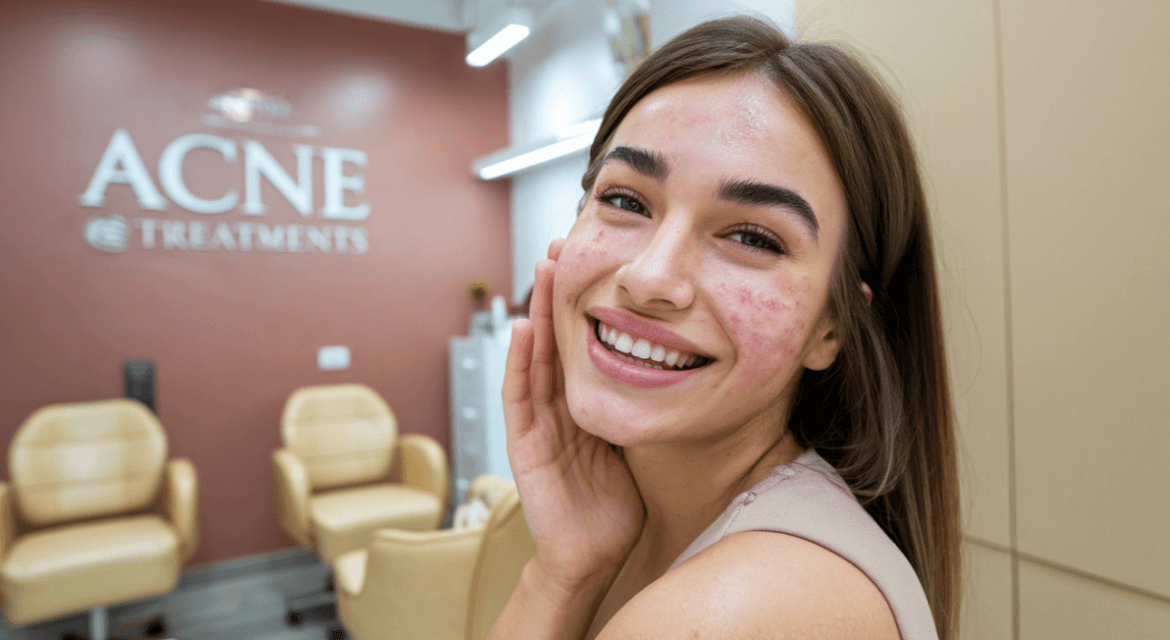Adult acne has emerged as a phenomenon in the past 20 years. The patients suffering from acne after puberty fall into various age groups over the age of 20, with the majority being between 25 and 40 years old, and rarely over 50. Women are significantly more affected by adult acne than men. Studies show that up to 22% of women experience adult acne compared to only 4% to 12% of men.
It is believed that the adult acne is linked to the hormonal fluctuations, as well as the stress factors. These influences stimulate the secretion of adrenal androgens, leading to the enlargement and overactivation of the sebaceous glands and the development of comedones. The hormonal imbalance in the cases of adult acne is evidenced by the premenstrual exacerbations of the skin changes, the appearance of late acne during pregnancy, upon starting or stopping a contraceptive treatment, and during menopause. The other important factors that act in combination feature a genetic predisposition, smoking, and improper skincare, including makeup application. The diet also plays a role. It is known that the high glycemic index and the excessive consumption of dairy products can worsen the acne. The intake of medications, whether topically, or orally, can also lead to the development of acne, such as the so-called “fitness acne”, which is associated with the use of anabolic steroids or high-protein dietary supplements.
Acne can also result from the use of inappropriate cosmetic products. If you have a naturally oily skin, you should look for skincare products labelled “non-comedogenic” or “water-based”. These products are less likely to clog your pores.
When you have pimples, it is natural to want to wash your face frequently. According to the dermatologists, the excessive face washing can worsen the acne because you can disrupt the skin barrier, allowing external agents such as bacteria and irritants to cause an additional inflammation. Your skin may try to overcompensate for the dryness by producing even more sebum, which can lead to more acne.
The stress, the poor sleep habits and the poor diet can also contribute to the exacerbation of acne. If you believe any of these factors is the cause of your acne, keep a journal and consult a dermatologist.
Treatment of the adult acne

The dermatologists explain that the treatment of the adult acne is complex. It often requires a combination of the topical and systemic treatments because the monotherapy usually does not yield results or provides only short-term relief.
One of the most common topical treatments includes the use of benzoyl peroxide, which helps kill the acne-causing bacteria and reduces the inflammation. Additionally, salicylic acid can help exfoliate the skin and unclog the pores. Topical antibiotics like clindamycin and erythromycin are also used to reduce the bacteria and the inflammation.
The dermatologists also recommend the use of chemical peelings alternated with apparatus procedures such as Derma Clear, Clear Skin, and the laser carbon peelings with Alma-Q, combined with dietary adjustments and, if necessary, the intake of isotretinoin or spironolactone. Furthermore, they strongly recommend the daily home skincare with appropriate cosmetics.
Use of retinoids

The retinoids – the medicinal derivatives of vitamin A – can also help. The retinoid creams can combat the acne by reducing the production of sebum and unclogging the pores. Some of the commonly used retinoids include tretinoin, adapalene, and tazarotene, which can also help improve the skin texture and tone.
In more severe cases, oral medications may also be prescribed. The oral antibiotics like doxycycline and minocycline can reduce the bacteria and the inflammation. In addition, some hormonal treatments, such as birth control pills and anti-androgens like spironolactone, can help regulate the hormonal fluctuations that contribute to acne.
With patience, the acne can be overcome. During an acne consultation, the dermatologists would usually explain the possible causes of its occurrence and the respective methods to combat it. The patient must understand that the results are not always guaranteed, and if one method does not work, they should be informed about the next possible option.
In the treatment of acne, they also rely on the assistance of colleagues from other specialties, such as endocrinologists, dietitians, and obstetricians-gynaecologists. The reason is that acne is not just a skin condition but a systemic disease. The manifestation is on the skin, but the issues can be of different nature. Therefore, before starting the treatment, it is important to conduct the necessary blood and hormonal tests, to implement a dietary regime, and to establish a skincare routine.
Adult acne is a multifaceted condition influenced by various factors such as the hormonal fluctuations, the stress, the genetics, the diet, and the improper skincare. It requires a comprehensive treatment approach that often includes a combination of topical and systemic therapies, lifestyle modifications, and sometimes collaboration with other healthcare specialists. The understanding of the underlying causes and the maintenance of a consistent skincare routine are crucial steps in its management that eventually lead to overcoming the adult acne. While the journey towards your clear skin can be challenging and requires patience, with the right guidance and treatments, the achievement of a clearer and healthier complexion is entirely possible.


